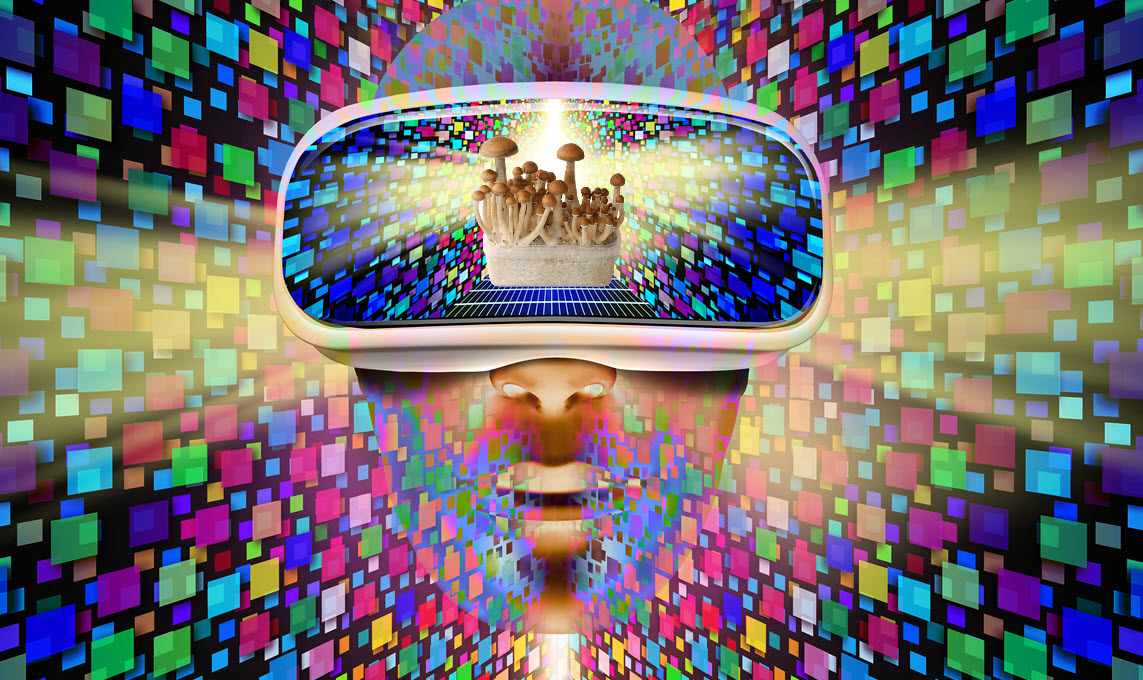
Are Psychedelics Opening the Doors to the Metaverse for Human Evolution Right Now?
Do Psychedelics Open Doors to the Metaverse?
You’ve probably heard the term “metaverse” on the internet for the past few months.
But what does it actually mean?
According to venture capitalist Mathew Ball, who has written several essays about the Metaverse, “The Metaverse is a 3D version of the internet and computers in general,” he tells Vice. He goes on to explain that there are two ways to define it based on context: “When these two technologies (Internet and computers) first appeared, all interactions were primarily text-based (emails, messages, usernames, email addresses). Then they slowly became more media (photos, videos, live streams). The next step up in user interface and user experience is in 3D. Second, if we imagine a mobile phone placing a computer in our pocket and the internet always available, imagine the metaverse as always within a computer and within the internet,” he explains.
So in summary it is a 3D version of the internet, a place where we live parallel to our real physical environment. This is our digital home: this is where we store our digital footprint, post photos, and communicate with others through our phones and computers.
At the moment, the metaverse has not yet become a reality. Not until we have a single gateway to enter the metaverse.
So, are psychedelics the answer to entering the metaverse in the (near) future?
The role of psychedelics
Psychedelics are currently in a heyday. With millions of people worldwide suffering from some form of mental health disorder and how the world seems to continue to fall apart, we all need psychedelic therapy.
So how can psychedelics possibly open doors to the metaverse?
Perhaps in the near future we could use psychedelics along with virtual reality to treat mental health issues: using the metaverse to treat a dysfunctional reality in the virtual world to effectively treat our “real” reality. For example, using VR devices to recreate the origins of one’s post-traumatic stress disorder (PTSD) while taking psychedelics under the guidance of a therapist or clinical professional and using that context to help the patient progress through their PTSD.
Take Emotional Intelligence Ventures (EI) for example: This company is now working on how psychedelic assisted therapy can be carried out in the metaverse. Anyone open to such experimentation can potentially get into the metaverse and make it back with stories to tell.
According to David Nikzad, the founder of EI, the company is trying to take advantage of virtual reality to break down the barriers of economy and geography and prevent the majority of the population from seeking psychedelics-assisted therapy. “The reality of being able to offer a psychedelic experience to a billion people [is that] not everyone will be able to fly to Maui or Peru and have a $100,000 experience,” Nikzad tells The Drum. “What we understood by technology – and we saw that back when Metas Oculus was born – was that eventually you could give people a psychedelic journey, and a shaman would show up, or Ram Dass would show up, and he would take you journey through.” something like a Hawaii that would be done with a PS5,” he says.
Just as in the days of the Internet, companies in every industry are striving to be among the first to enter the World Wide Web. It’s the same now: brands across multiple industries are rushing to establish a presence in the Metaverse. The psychedelics industry is no different, but its impact on humanity could be extremely profound.
Healing in the Metaverse
EI Ventures bought a 12 x 12 lot at Sandbox, a subsidiary of Animoca Brands, a Hong Kong-based blockchain gaming company. It is now the third largest virtual land sale in the Metaverse, valued at over $2 million. But more than just real estate, the space called PSLY.com is where the merger with Mycotopia Therapies will be based.
“The combination of our tech, cannabis, psychedelics, space and crypto related holdings will all capitalize on this exciting space,” Nikzad said in a statement. “We are very excited to invite all of our portfolio companies and investors to be a part of something extraordinary.”
Last November 2021, Canadian company Revitalist announced the acquisition of Revitaland Meta Tech Inc., where it intends to develop virtual clinics within the Metaverse. The development of these virtual clinics is led by Metachain Technologies, which has a 40% stake in Revitaland. Since 2018, Revitalist has delivered thousands of ketamine treatments for patients with treatment-resistant mental illness.
“A virtual clinic offers patients an alternative to traditional treatment options and also places Revitalist at the forefront of the virtual interactive world when it comes to mental health. Our team will work closely with Revitalist to ensure patients have a quality experience when visiting Revitaland. Technology in the Metaverse is changing at a rapid pace, with large tech companies like Facebook and Microsoft devoting significant time and resources to implementing projects in the Metaverse,” said Matthew Connelly, CEO of META.
Conclusion
These are certainly exciting times: while the metaverse is still in its infancy, the creation of this new virtual world and the use of psychedelics has great potential to help make psychedelic therapies for mental disorders more accessible than ever. Surely more research is needed so we can better understand what the metaverse can bring to the world of mental well-being, but it all seems promising.
NOW PSYCHEDELICS, READ MORE..

I TRIED LSD AND WEED TOGETHER, READ THIS!

Post a comment: